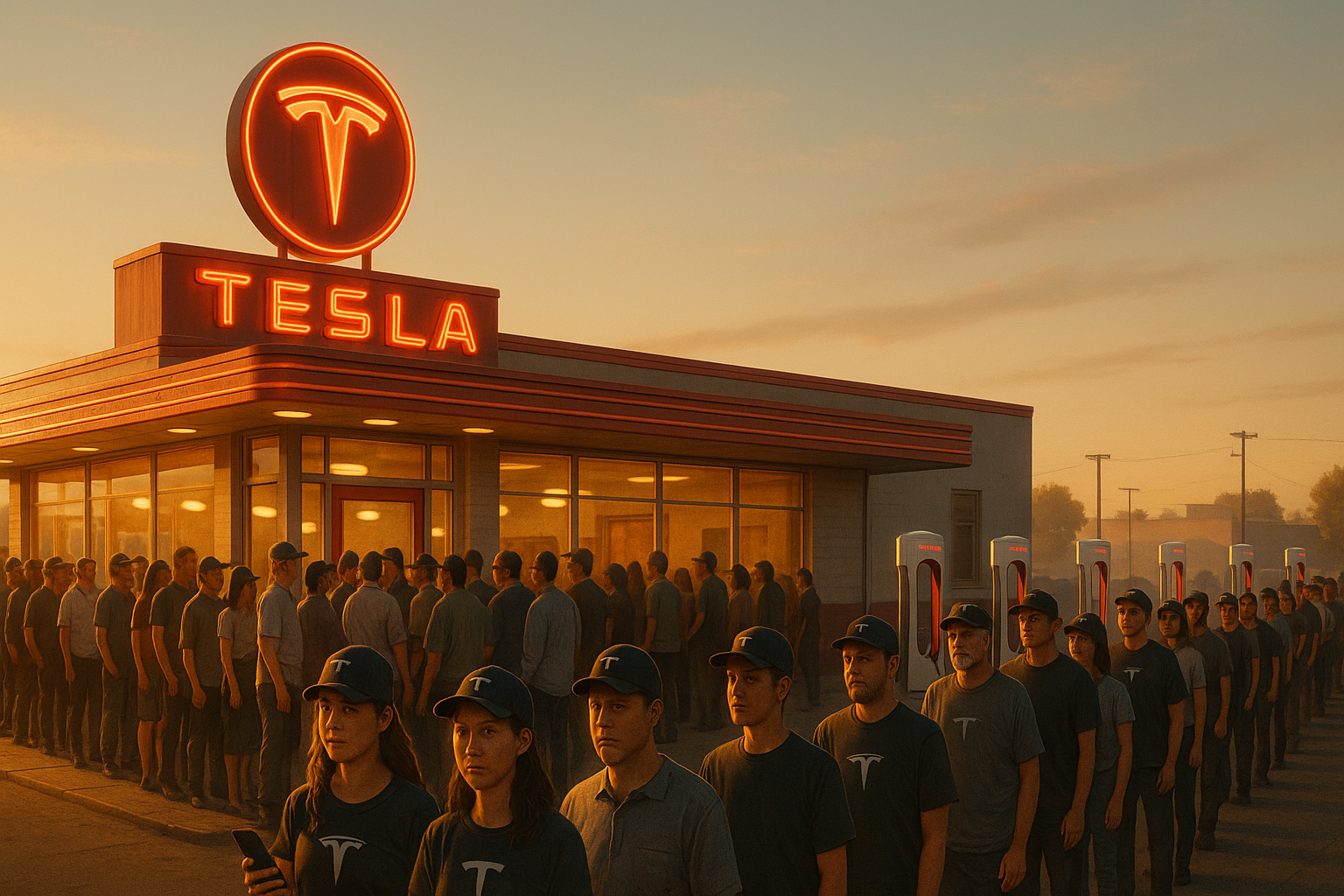The line stretched around the block—a strange, almost surreal sight. Not for a new iPhone, or a sneaker drop, or even a concert. No, these devoted souls were queuing up for... a diner.
I stood there watching them early Thursday morning, these Tesla faithful, clutching their smartphones and dressed in company-branded merchandise. They'd camped overnight—some for nearly 24 hours—just to be among the first to experience Elon Musk's latest venture: a combination charging station, retro-themed restaurant, and open-air cinema in Hollywood.
Let's be clear about something. It's a burger joint. With electrical outlets.
But watching the scene unfold, I couldn't help thinking we were witnessing something far more significant—a new kind of American religion taking shape before our eyes.
"I've been following Elon since PayPal," confessed Marcus, a 42-year-old software engineer who'd arrived at 5 a.m. with his Tesla-owning buddies. "This isn't just about eating a burger. It's about being part of the future."
When I asked if $16 seemed steep for the "Autopilot Burger," he looked at me like I'd questioned gravity itself.
That's when it hit me. This wasn't normal consumer behavior—this was devotion. And it explains more about Tesla's astronomical stock valuation than any spreadsheet ever could.
The financial world has long struggled to rationalize Tesla's market numbers. While traditional automakers like Ford and GM typically trade at 5-10 times earnings, Tesla has often commanded multiples well over 100x. Conventional wisdom points to growth potential, technological edge, and Musk's "visionary" status.
But after speaking with dozens of the faithful at the diner opening, I'm convinced something else is happening—what might be called a "Devotional Premium" in Tesla's stock price.
It's the portion of market capitalization derived not from cold financial analysis but from quasi-religious fervor.
This isn't entirely unprecedented. Apple enjoyed something similar during the Jobs era (I covered those product launches, which often resembled revival meetings more than corporate events). But Tesla has pushed this dynamic to extraordinary new heights.
"I own the car, the Powerwall, the stock—and now I'll eat the food," laughed Sandra, a 35-year-old marketing executive standing in line. "My husband thinks I'm crazy, but he just doesn't get it."
What exactly doesn't he get? I asked.
"That this is bigger than cars or burgers. It's about saving the planet while moving humanity forward."
Look, behavioral economists have a term for this—"identity economics." People make purchasing decisions partly to reinforce their sense of who they are or aspire to be. Tesla ownership isn't merely transportation; it's a public declaration of one's values, politics, and worldview.
And Musk? He's mastered what can only be described as corporate transubstantiation—turning ordinary products into sacred objects through the alchemy of his personal brand.
A charging station becomes a pilgrimage site. A sedan becomes a membership card to an exclusive ideological club. A hamburger becomes... well, communion.
The business implications here aren't trivial.
When your customers are devotees rather than consumers, price sensitivity practically vanishes. Brand loyalty becomes nearly unshakable. Marketing happens organically through evangelism (have you ever met a Tesla owner who didn't try to convert you?).
Perhaps most importantly, this devotion translates into serious capital advantages. Tesla can raise money at terms that make traditional auto executives weep with envy.
But—and this is crucial—devotional businesses face unique vulnerabilities too.
Religious fervor can dissipate rapidly when prophets prove fallible. Tesla's stock has experienced gut-wrenching volatility that correlates less with quarterly results and more with Musk's increasingly erratic public persona—from smoking weed with Joe Rogan to his, um, eclectic management of Twitter/X.
There's also the awkward contradiction that many Tesla owners align themselves with progressive environmental values, while Musk himself has veered sharply rightward politically. This creates cognitive dissonance that the faithful must either resolve or ignore.
One owner I spoke with, who preferred to remain nameless, admitted the tension: "Sometimes I have to separate the man from the mission. The mission is still worth believing in."
For investors, this raises profound questions that aren't covered in finance textbooks. How do you value devotion? What's the appropriate discount rate for religious fervor? When does faith become financially material?
The smartest analysts I know have stopped pretending Tesla can be evaluated through conventional metrics. Instead, they're studying the psychology of its investor and customer base—more sociology than finance.
Meanwhile, back at the Hollywood diner (which, I should mention, actually looks pretty cool with its mid-century aesthetic and 32 charging stalls), the faithful continue waiting, posting, hashtagging.
One couldn't help noticing the circular economy at work: social validation reinforcing brand loyalty, brand loyalty justifying premium pricing, premium pricing supporting stock valuation, stock appreciation validating the original devotion.
Until, of course, it doesn't.
Which is the nature of both markets and faiths. They persist until the moment they collapse, often with little warning and dramatic consequences.
For now, though, business is booming at the Tesla diner. And somewhere in Detroit, auto executives are scratching their heads, wondering how they missed the obvious strategy: forget better cars—what the people really wanted was a better burger with a side of salvation.
